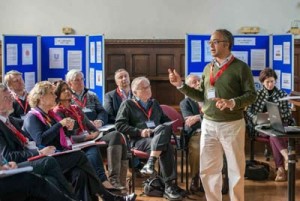Report on the 2014 Faith in Business conference
by
Richard Higginson
Faith in Business Quarterly 16:4 pp21-23
Where is God in all stages of a company’s life, even the failure or decline? A series of talented speakers reflected on each stage, and concluded that Jesus is the Alpha and Omega, the beginning and the end, and all in between. Richard Higginson summarises.

Buzz group discussion
It’s all about people!’ That is how one delegate summed up our 2014 spring conference during the plenary session. There was a murmur of agreement round the room. Relating well to people is crucial to the functioning of business. It also expressed the feel of the conference itself. This was a group of people who enjoyed meeting with each other and found much mutual stimulus, support, encouragement and fellowship over the course of the weekend. Existing friendships were deepened and many new ones forged.
Bjorn Mathiesen from Norway set us on our way on Friday evening with a helpful overview of the typical business lifecycle. He showed how companies parallel many normal stages of human development, including dealing with loss, and that they interact with the ups and downs of individuals. He shared his experience of involvement in the restructuring and repositioning of three mature companies that stood at a crossroads between decline or the resumption of growth. He identified several relevant Christian perspectives: the facilitation of space and pace for mourning; time for joy and festivity; willingness to apologise which can lead to forgiveness and reconciliation; time for renewal; ethical compliance; community building. The contribution Christians make may seem modest. Bjorn’s closing words – which I picked up in my closing sermon on Sunday morning – were that “Jesus Christ is the first letter and the last. We are the letters in between’. But those ‘in between’ letters are still significant for the making of words and bringing meaning to people’s lives; we should not underestimate our potential contribution.
The evening ended with a buzz group session where people identified reasons for wanting to start a company. Ideas that featured prominently were: desperation; dissatisfaction with the status quo; fulfilling a dream; the desire to make a difference and create something better; being in charge of one’s destiny; working in an ethical way; filling a space in the market; and a sense of God’s calling. Good reasons for starting a company were seen as job creation, benefiting humanity and causing people to flourish. Bad reasons were seen as making destructive products, allowing the company to become idolatrous or only being concerned with making money, to the detriment of people or planet. Signs that it might be right to go ahead included: positive advice from trustworthy people; using our abilities as indicators; recognising a door is open; development of the necessary character; a God-given sense of peace. To make a success of launching a company, various resources and skill-sets are necessary: a strong idea; patience; courage; connections; raw materials; capital; a complementary team;drive, energy and inspiration. Participants shared vividly from their experience to illustrate these various points.

Ravi speaking to rapt audience
On Saturday morning, Ravi Gidoomal and David Cross, who work on the Growth Accelerator programme with Grant Thornton, talked about Unlocking Growth. They asked the fundamental question ‘should we be pursuing growth?’ and thought the answer in most cases is yes; it is usually God’s natural plan in life. Business growth is often about commercial differentiation – providing something significantly different from anyone else. Ravi and David asked the question: how do we align this quest for growth with spiritual values? Their answer was to be purposeful about (or to have specific goals for) our business life, to be expectant and to be generous. They then identified a ‘dependent’ differentiation: a dependency upon God rather than seeking absolute control over events – the latter often betrays a lack of faith and can lead to unethical behaviour. They drew our attention to two stories about Abraham (Genesis 22 and 20), one of which shows him displaying trust in God and the other failing to do so. Sometimes we need the willingness to ‘let go’ in order to experience God’s blessing. Nevertheless, overseeing the growth of a business often requires a lot of commitment. Ravi and David observed a tendency for local churches to expect too much of their businesspeople, often to the detriment of their business.

The Clarkson brothers in humorous mood
Court and Matt Clarkson provided an entertaining double act as brothers who work together for Magis Partners. They made the interesting observation (confirmed by interaction with delegates) that the word ‘mature’ evokes attributes of wisdom, stability and credibility with reference to people; but when a business is labelled mature it often conveys a sense of stagnation, the loss of creativity, and even impending decline. Mature companies may actually be suffering from immaturity; and the key to their revival can be to assimilate more of those characteristics of personal maturity. Court and Matt emphasised key aspects of maturity in a business context as the ability to respond to the environment in an appropriate manner, knowing when to act and how to behave. Clinging to the promises of God, practising spiritual disciplines, shining a light on root causes and seeking to heal in troubled situations are all ways in which Christians can be a positive force in companies that are teetering on the brink. This session finished with our splitting into groups where we identified and sought to address a real difficult issue that one of the group was facing.
On Saturday afternoon, Paul Kinrade spoke from extensive experience on the topic of Handling Company Closure. He combined plain-speaking, realistic business advice with a compassionate concern for all involved in ailing businesses. He identified many signs of potential distress, ranging through management indicators (eg lack of strategic direction; a company ‘stuck in the middle’ with no clear differentiation), marketing indicators (eg an unprofitable major contract or loss of a profitable major contact), operational indicators (eg frequent changes in key suppliers, which tends to mean they’re not being paid) to financial indicators (eg inadequate financial reporting highlighted by the Goldilocks test – ‘not too much/not too little/just right!). The most important indicator is supply of cash: a company may be profitable on paper but if it has no ready supply of cash it’s in trouble.
Paul sees saving jobs and companies as highly desirable. He favours openness with employees, which includes asking their opinions on how a company might be saved. ‘For the vast majority of people, business is personal – treat them fairly and they will very often reciprocate’. He told some memorable stories about the revenge taken on companies by disgruntled employees. If a company has to be closed, it is important to treat all of the stakeholders affected as well as possible – maximising their ‘value’. This is crucial to safeguarding the company’s ‘good name’ (Proverbs 22:1). Paul finished by posing a case study about a bakery business with major problems; this proved very engaging and provoked a variety of responses from delegates about whether it was appropriate to close it or try to save it.
On Saturday evening, Sally Orwin Lee explored Where Business Fits in God’s Big Picture. She unpacked the Scriptures as God’s salvation history, showing how they answer the questions: who is God? Who am I? Who are you? She cited Kevin Vanhoozer and Paul Tripp who say that the Christian exercise of imagination – the ability to see what is real but unseen – meets a crucial need of our time. The drama of Scripture can be unpacked (as in my Faith, Hope & the Global Economy) in terms of a story of hope that is rooted in the resurrection of Jesus Christ and which anticipates the new heaven and the new earth. This enables us to make sense of and recover from episodes of disappointment and apparent failure in business life. Sally described how the company run by her and her husband John, doing ‘good work’, hit the buffers during the recession. This was hard to take, but understanding God’s big story genuinely helped; ‘what felt like disaster in 2008 we now see as God shaping us’, as both of them use their working skills in new and different ways – Sally in a coach and counselling capacity.
Finally, on Sunday morning, Gillian Stamp treated us to a feast of wise reflection on leadership, organisational life and ourselves as the persons involved in this and other aspects of life. Through her experience and research she has identified four key qualities in good leaders. Fundamentally, they treat people as people (not as numbers, resources or targets) and appreciate their multifaceted nature (maker, mischief, mystery, messy, magic). Leaders’ most valuable resource is their attention; they read context and provide the context for people to be the best they can be. They also have a good sense of timing, knowing that time is essential for learning and it is important not to act too soon. Overall, they have a highly developed awareness.
Gillian went on to speak about the four simultaneous journeys that each of us are embarked on: the journey of the self (what happens to us); the public journey (at work); the private journey (with spouse, family and friends); and the personal journey (the journey in which we care for ourselves and weave the other journeys together).
A key issue to emerge was the giving and handling of criticism. 360 degree feedback can be useful, but only if sensitively done. We all need people who tell us how it really is. ‘Speaking truth to power’ is best done by jesters and grandmothers, though 2 Samuel 12 also provides an impressive example in the prophet Nathan admonishing King David in private through a telling parable.
Life can be very demanding when challenges in these different journeys come to a head at the same time. Gillian cited the example of a married couple who both have responsible work positions and are faced simultaneously by the demands of adolescent children and elderly parents. Many of us could identify with that. Another question was: what happens when the public journey in terms of formal employment comes to an end? Active but unpaid work may still continue for another ten years or so. Gillian feels it is good to use retirement to review what one has done but not have too many regrets.
To ensure that this is not the case, how important it is to clarify one’s purposes earlier in life – and as Christians, to ensure that they are aligned with God’s purposes for our lives, serving Jesus Christ ‘the one who was and is and is to come’.